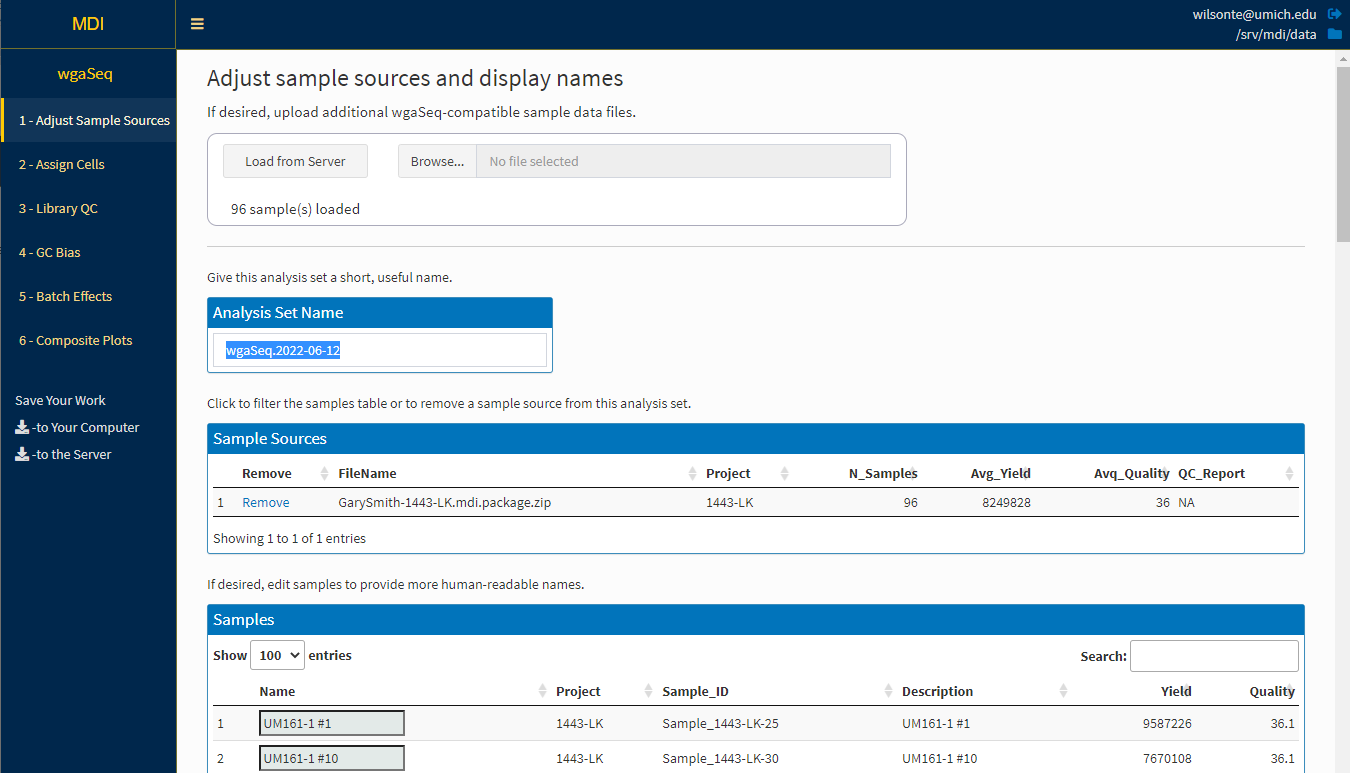sourceFileUpload appStep module
The sourceFileUpload appStep is the first step module of most apps. It allows users to:
- add additional data packages to create an extended Analysis Set
- provide a helpful name for the Analysis Set
- provide human-readable names for any Samples in manifestFiles
- examine high-level summaries of the data in their packages

For more detailed information, see:
Naming sourceFileUpload steps
The canonical name given to sourceFileUpload app steps is ‘upload’, which matches the step type declared in sourceFileUpload/module.yml. We recommend following this convention as it promotes consistency and readability.
# <app>/config.yml
appSteps:
upload:
module: sourceFileUpload
Definition and structure of data sources
Each data package loaded by a user is known as a data source, identified by a unique string identifier derived from a hash of the package file. A data source is also known as a Project for purposes of unambiguous sample naming.
For many apps built on data packages with manifestFile declarations, each data source will carry multiple samples, each identified by its own unique string identifier. Your app must know how to deal with an incoming manifestFile by properly handling its declared manifestType, as described in detail here:
Module options
The sourceFileUpload appStep does not take any non-standard module options.
Returned outcomes
These are the outcomes returned by the sourceFileUpload module that you may access in downstream appStep modules.
# sourceFileUpload_server.R
list(
outcomes = list(
analysisSetName = reactive(input$analysisSetName),
sources = reactive(sources$list),
samples = reactive(samples$list), # actually a data.frame
sampleNames = reactive(samples$names)
)
)
where:
- analysisSetName = the name the user gave to their analysis set
- sources = metadata on the data packages
- samples = metadata on the aggregated samples from all packages
- sampleNames = any human-readable sample name overrides entered by the user
Typically, apps do not access those outcomes directly, favoring instead to use the following support utilities.
Support utilities
These are the utility functions provided by the sourceFileUpload module to make it easier to get information about a specific data source or sample.
# <scriptName>.R
# get one or multiple sample names, with user overrides
# arguments allow different means of filtering and sample matching
names <- getSampleNames(rows = TRUE, sampleIds = NULL, sampleUniqueIds = NULL, makeUnique = FALSE)
name <- getSampleName(sample) # sample is a one row of the samples() table
# get the unique identifiers of samples
uids <- getSampleUniqueIds(samples = NULL, rows = TRUE, sourceId = NULL)
# get a full source, i.e., data package, metadata entry from its ID
source <- getSourceFromId(sourceId)
# get a packaged file from a data source by the file's type or name
dataFileName <- getSourceFile(source, fileType)
dataFilePath <- getSourceFilePath(sourceId, fileType, parentDir = NULL) # when we know a file by type
dataFilePath <- expandSourceFilePath(sourceId, fileName, parentDir=NULL) # when we know a file by name
# get the project name of a data source by ID
projectName <- getSourceFilePackageName(sourceId)
# get option values that were in force during pipeline execution by source ID
# optionFamily and option names are as defined in pipeline.yml
optionValue <- getSourcePackageOption(sourceId, optionFamily, option)
For more detailed information, see:
mdi-apps-framework : sourceFileUpload_utilities